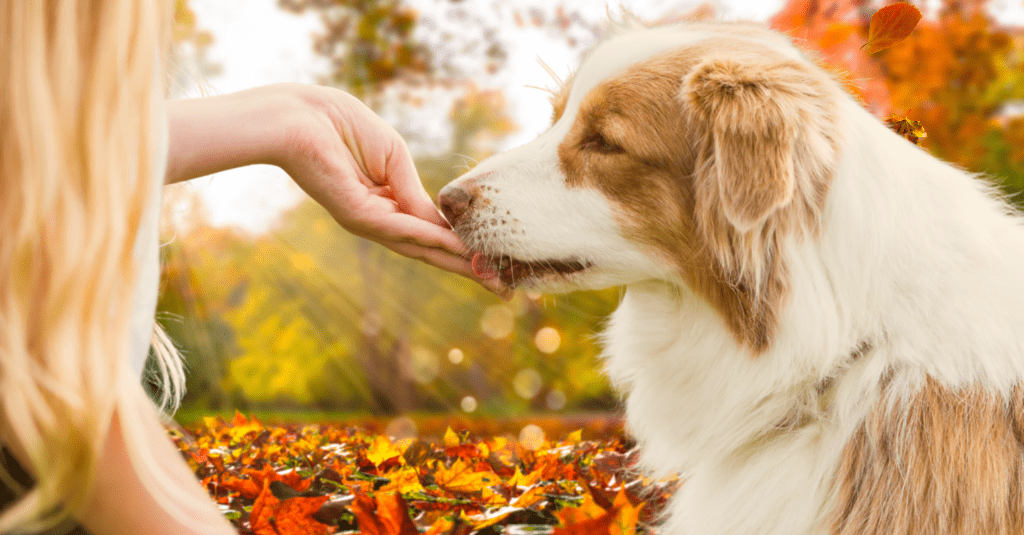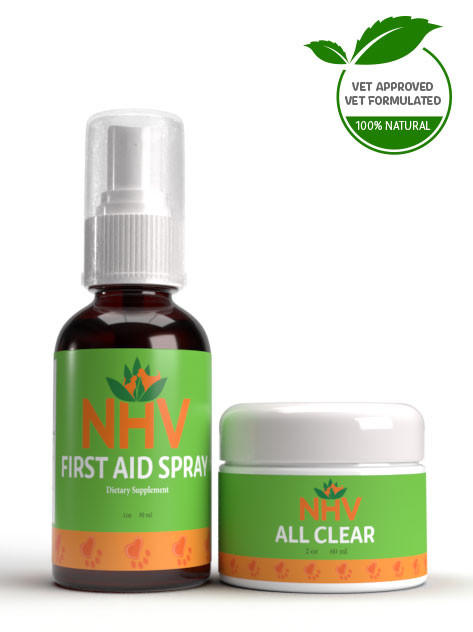- Description
- Ingredients
- Dosage
- FAQ
Description
ALL CLEAR OINTMENT
- Soothes inflamed skin
- Reduces itching
- Helps eliminate bacterial and fungal infections
- Supports the healing of dry, flaky, red, or greasy skin
FIRST AID SPRAY
- Natural antiseptic
- Helps prevent infection
- Speeds healing and reduces inflammation
- Reduces discomfort and irritation
- item number
- BD5003
- weight
- 1.40 LBS
- volume
- 1 fl. oz. (30ml) + (Ointment) 2 fl. oz. (60ml)
- life stages
- adult, senior, puppy/kitten
- form
- liquid
- made in
- Canada
Disclaimer: The information provided in relation to the products mentioned is intended for general informational purposes only and should not be construed as professional veterinary advice or a substitute for consultation with a qualified veterinarian. These products are not intended to diagnose, treat, cure, or prevent any pet health condition. Consult a licensed veterinarian before using any product or making changes to your pet's diet, health, or wellness routine. Individual pet health outcomes may vary, and the effectiveness of the product may depend on various factors specific to your pet. Always carefully read and follow the product label and instructions. The manufacturer and distributor of these products do not assume any liability for any direct or indirect consequences that may arise from the use of these products on pets. All information is for educational purposes only.
Ingredients
ALL CLEAR OINTMENT
Calendula - has a long history of use for wounds, dermatitis (itchy skin), flea bites, poison ivy, eczema, and burns.
Echinacea - contains many healing compounds such as polysaccharides which help to stimulate white blood cell production, help to reduce inflammation, fight infection and encourage healing.
Rosemary Leaf - is an all-natural disinfectant herb that helps to fight infection and encourage fur regrowth.
FIRST AID SPRAY
Neem – Contains antibacterial antiviral properties that speed healing.
Marigold – Contains essential oils and various other compounds that speed cell reproduction and prevent bacteria and fungi from infecting a cut.
Aloe Vera – A topical skin dressing that softens and soothes the skin and promotes speedy healing of minor wounds.
Usnea – An antibacterial agent that prevents infection in cuts.
California Poppy – Helps relieve pain and prevent infection associated with cuts and scratches.
Tea Tree Oil – An effective antiseptic useful in the treatment of wounds and cuts.
Inactive ingredients such as water, glycerin, or bases for ointments like olive oil are not listed in this ingredient tab. For a full list of ingredients, please see the label picture on the bottle, shown above. Information about ingredients is for educational purposes only. It is important to always refer to the product label for the most accurate and up-to-date information regarding ingredients.
Dosage
ALL CLEAR OINTMENT
How to Administer
Topical ointment: Clean and dry affected area(s). Apply to affected area 3 to 4 times per day. It may some times be necessary to shave or trim your pet’s hair so that the All Clear Ointment may penetrate better.
Caution
Do not apply on open or bleeding wounds.
FIRST AID SPRAY
How to Administer
Topical Spray: Spray several times a day to affected area until healed.
It may some times be necessary to shave or trim your pet’s hair so that the First Aid spray reaches the affected area. If necessary, cover the affected area with gauze dressing.
Caution
Do not spray near or into eyes or nose. May initially sting on open cut
FAQ
Can an abscess resolve on its own?
An abscess is a collection of pus under the skin or deep in the tissues, caused by infection. Once an infection is severe enough to cause an abscess, it is not likely it will resolve on its own and could potentially make your pet very sick.
Is an abscess the same as a cyst?
An abscess is not the same as a cyst. A cyst is a pocket of fluid, and so is an abscess, however an abscess is generally full of pus or purulent fluid and is caused by an infection.
Can an abscess become cancerous?
Abscesses are caused by infection and generally are not at risk of becoming cancerous. Though they should be treated promptly to avoid serious complications.



 USD
USD
 Canadian Dollars
Canadian Dollars




